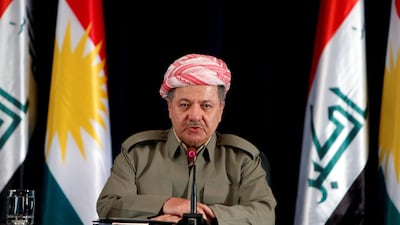Iraq's internal conflict continues to take uncomfortable twists. Following last month's ill-advised gamble on independence by Masoud Barzani, the president of the semi-autonomous Kurdistan Regional Government, Baghdad has reasserted its authority.
This week, bowing to the inevitable and concerted pressure from at home and abroad, Mr Barzani announced he would step aside as the leader of Iraqi Kurds. "After November 1, I will no longer exercise my functions, and I reject any extension of my mandate," he said. Immediately following his televised resignation speech, two Kurdish opposition parties – Gorran, and the Patriotic Union of Kurdistan – reported that some of their regional offices had been attacked and looted. Both parties supported the right for self-determination, but neither believe the referendum was well-timed. If you were so inclined, it would not be hard to draw connections between Mr Barzani's resignation statement and the instant reprisals meted out on his political opponents.
Mr Barzani has been a symbol of Kurdish nationalism since 1979. Defiant to the last, he has passed up the chance to demonstrate he can be a true statesman of depth and courage. Instead of promoting concession and consensus, he has chosen a path of defiance and division. In a letter to parliament he said he would "remain a peshmerga" and "continue to defend the achievements of the people of Kurdistan". Instead of using his political currency to bargain for peace, he has calibrated a course for conflict.
Compare this to the man charged with ensuring the centre holds. According to AFP sources, Haider Al Abadi, Iraq’s prime minister, brokered a deal for the Baghdad government to deploy troops at a key border crossing in Iraqi Kurdistan. Separately he has recently sought counsel from the international community, including Emmanuel Macron, the French president, who last weekend called for dialogue to avoid conflict.
_________________
Read more
Barzani’s independence gamble has failed. Now Baghdad has the upper hand
Moderation and caution should be the watchwords in a Kurdish crisis that could spiral out of control
If the US wants to support Iraq, it needs to be honest about Kirkuk
_________________
All of this plays out as the fight to rid the country of ISIL draws closer to a conclusion. Mr Barzani’s fight for self-determination should never have been allowed to hijack the struggle to rid the country of extremism and prevent its total fracture.
If only the problem was limited to Mr Barzani’s skewed perspective. In stepping aside, he has not stood down. Rather, he has sought a political bargain where his powers be carved up between the government, parliament and judiciary, all institutions he will continue to seek to influence. Similarly, his son is expected to campaign to be his replacement at the next election. For all that Mr Barzani says he will “reject any extension of his mandate” after Wednesday, his political manoeuvres look more like a recalibration of his interests than a resignation.



























